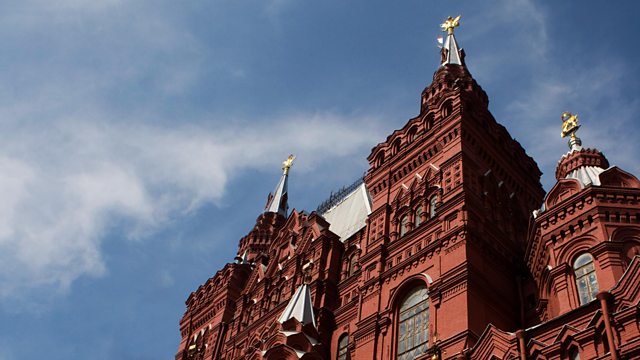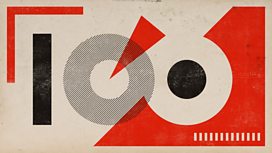
Russia after the Revolution
A sequence of readings and music from Russia in the last century, from banned early novels to futuristic post-Soviet writing and with music by Prokofiev and Schnittke.
A sequence of readings and music from Russia in the century since the revolution, ranging from writings banned in the early Soviet years (Bulgakov's surreal novel The Master and Marguerita) to the futuristic post-Soviet writing of Vladimir Sorokin. Music includes the two titans of the Stalin era, Prokofiev and Shostakovich, as well as the polystylistic blendings of light and serious music by Alfred Schnittke.
Readings by Henry Goodman and Dolya Gavanski.
Part of Radio 3's season Breaking Free: A Century of Russian Culture.
Last on
![]()
Breaking Free: A Century of Russian Culture
�鶹������ҳ��� Radio 3's exploration of the 1917 Russian Revolution and its cultural reverberations.
Music Played
Timings (where shown) are from the start of the programme in hours and minutes
-
![]() 00:00
00:00Alfred Schnittke
Polka (from Revis Fairy Tale)
Performer: Ksenija Siderova (accordion).- Champs Hill CHRCD019.
- Tr10.
-
Mikhail Zoshchenko
The Hat, read by Henry Goodman
![]() 00:00
00:00Sergey Prokofiev
Repentance (from Summer Day, childrens suite Op.65a)
Performer: New London Orchestra conducted by Ronald Corp.- Hyperion CDA66499.
- Tr12.
Teffi (Nadezhda Aleksandrovna Lokhvitskaya)
Ganka the peasant girl (from Love), read by Dolya Gavanski
![]() 00:00
00:00Trad
Djelem
Performer: Loyko.- Rough Guide RGNET 1107.
- Tr4.
Yevgeny Yevtushenko, transl. by James Dickey with Anthony Kahn
Ballad About Drinking, read by Henry Goodman
![]() 00:00
00:00Gliere
Dance of the Soviet sailors from SS Apple (from The Red Poppy)
Performer: Bolshoi Theatre Orchestra conducted by Yuri Fayer.- Olympia OCD202.
- TR4.
Yuri Olesha
the cooking commissar visits a workers kitchen (Envy, Chapter 2) read by Dolya Gavanski
![]() 00:00
00:00Dmitry Shostakovich
String Quartet no.1 Op.49, 1st movement
Performer: Brodsky Quartet.- Chandos CHAN109176.
- CD1 Tr1.
![]() 00:00
00:00Lev Knipper
Song of the Plains
Performer: Red Army Ensemble.- EMI 3920312.
- Tr15.
John Vaillant
tiger hunting in Eastern Russia (from The Tiger) read by Henry Goodman
![]() 00:00
00:00Sergey Prokofiev
The Quarrel (from Cinderella Suite no.1, Op.107)
Performer: Royal Scottish National Orchestra conducted by Neeme Jarvi.- Chandos CHAN7076.
- Tr12.
![]() 00:00
00:00Alfred Schnittke
Love (from The Commissar)
Performer: Berlin Radio Symphony Orchestra conducted by Frank Strobel.- Capriccio C7196.
- CD1 Tr12.
Mikhail Bulgakov (transl. Michael Glenny)
the talking suit (from The Master And Margarita) read by Dolya Gavanski
![]() 00:00
00:00Dmitry Shostakovich
Symphony no.1 in F minor, Op.10, 2nd movement
Performer: Netherlands Radio Philharmonic Orchestra conducted by Mark Wigglesworth.- BIS SACD 1603.
- Tr2.
Alexander Solzhenitsyn (transl. Max Hayward, Manya Harari & Michael Glenny)
the mock trial of Prince Igor (from The First Circle), read by Henry Goodman
![]() 00:00
00:00Alexander Borodin
Polovtsian Dances (from Prince Igor)
Performer: Bavarian Radio Symphony Orchestra conducted by Esa-Pekka Salonen.- Philips 412552-2.
- Tr4.
Marina Tsvetaeva (transl. Elaine Feinstein)
My Desk, read by Dolya Gavanski
![]() 00:00
00:00Vyacheslav Guyvoronsky
Blues in C major
Performer: Vyacheslav Guyvoronsky (trumpet) and Vladimir Volkov (bass).- Golden Years GY401404.
- CD1 Tr9.
Yevgeny Yevtushenko, transl. by James Dickey with Anthony Kahn
Pitching and Reeling, read by Henry Goodman
![]() 00:00
00:00Mikael Tariverdiev
Nocturne (from Olga Sergeevna)
Performer: Mikael Tariverdiev (piano).- Earth Records EARTHCD020.
- Tr12.
Ekaterina Sedia
the Rusalki scene (from The Secret History of Moscow) read by Dolya Gavanski
![]() 00:01
00:01Myaskovsky
Symphony no.7 in B minor Op.24
Performer: USSR Radio Symphony Orchestra conducted by Leo Ginsburg.- Olympia OCD163.
- Tr6.
![]() 00:01
00:01Mikael Tariverdiev
Moscow Morning ((from Olga Sergeevna)
Performer: Mikael Tariverdiev (piano) and studio ensemble.- Earth Records EARTHCD020.
- Tr14.
Victor Pelevin, transl. Andrew Bromfield
trainee cosmonaut learns to use a moonwalker (from Omon Ra) read by Henry Goodman
![]() 00:01
00:01Vangelis
Deckard and Roy's Duel (from Bladerunner)
- UMe B0010558-02.
- CD2 Tr7.
Vladimir Sorokin, transl. Jamey Gambrell
Moscow, 2028 the Oprichnik buys cigarettes (from Day of the Oprichnik) read by Henry Goodman
Producer's Note
A selection of stories and episodes from life in Russia since the 1917 Revolution, ranging from the optimism of Mikhail Zoshchenko’s story of how rail travel has improved in the 1920s, to the bleak surrealism of Victor Pelevin’s story of a cosmonaut in training, whose equipment is clearly not up to spec for space travel. Teffi’s narrator remembers, as a privileged young girl, admiring the peasant women who worked as gardeners; while a tougher life is described by a hunter who lived near Vladivostock in the far East , where tigers were hunted and shot for sale to Chinese apothecaries. <?xml:namespace prefix = "o" ns = "urn:schemas-microsoft-com:office:office" />
Solzhenitsyn’s novel of life in a “special prison” (for highly qualified political prisoners) The First Circle, provides a discussion of the legendary Russian hero, Prince Igor, who is found guilty of treason by the prisoners in a satirical mock trial. Borodin’s majestic Polovtsian Dances from his opera Prince Igor sound rather different in this light.
Yevtushenko’s Ballad About Drinking is a rollicking tale of what happens when a ship’s crew come ashore only to find that the vodka shop is closed; and a scene from Yuri Olesha’s quirky novel about an ambitious mass-catering manager sees him being ignominiously repelled from a workers’ kitchen.
One of the most famous Russian novels of the 20th century is Bulgakov’s satire The Master And Margarita (written in the 1930s but not published in Russia until the 1960s, and in a censored form).
The Devil is abroad in Moscow, and his sidekick Behemoth makes a businessman invisible (but his suit carries on working).
The fantastical vein continues in scenes from two recent novels – in Ekaterina Sedia’s The Secret History of Moscow, where the narrator is pulled under the ice of the Moscow River by water spirits; and in the dystopian future Russia depicted by Vladimir Sorokhin in his Day of the Oprichnik – the Oprichnik being a sort of official gangster force serving “His Majesty” - the Czar.
The music ranges from the revolutionary fervour of Gliere’s 1927 ballet The Red Poppy to the more ambiguous zaniness of Shostakovich’s first symphony and Prokofiev’s Cinderella. Alfred Schnittke’s polka has a desperate stop-start jollity; while darker moods are invoked by Guyvoronsky’s smoky Blues for trumpet, and Tariverdiev’s chilly Moscow Morning.
Producer: Philip Tagney
Broadcast
- Sun 5 Nov 2017 17:30�鶹������ҳ��� Radio 3
The hidden history of plant-based diets
Books website
Get closer to books with in-depth articles, quizzes and our picks from radio & TV.




